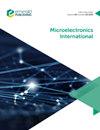Radiation-hardened flip-flop for single event upset tolerance
IF 0.8
4区 工程技术
Q4 ENGINEERING, ELECTRICAL & ELECTRONIC
引用次数: 0
Abstract
Purpose The purpose of this paper is to present a transition detector (TD)-based radiation hardened flip-flop (TDRH-FF) for single event upset (SEU). Design/methodology/approach With SEU recovery and single event transient (SET) detector mechanism, the TDRH-FF can tolerate SEU during hold mode and generate a warning signal for architecture-level recovery during transport mode when input signal contains SET. Evaluation results show that the TDRH-FF outperforms comparable comprehensive performance. Findings Simulation results show that 1) the mean pulse width of the correction glitches (at full width half maximum) of TDRH-FF is less than 10 ps; 2) the area overhead of TDRH-FF is similar to the EVFERST-FF, BISER-FF and DNURHL-FF; 3) TDRH-FF has the same average power consumption as SETTOF, and moderate PDP and Ps values among these compared FFs. Originality/value In this paper, a TD-based TDRH-FF is proposed to solve the problems in the previous design. And the main contributions of the proposed TDRH-FF are summarized: Minimum size transistors are used in the proposed TD which leads to a considerable decrease in area overheads and propagation delay (resulting in an ignorable correction glitch); and compared with other radiation hardened flip-flop, TDRH-FF outperforms comparable comprehensive performance.针对单一事件干扰的抗辐射触发器
目的提出一种基于跃迁检测器(TD)的单事件扰动辐射强化触发器(TDRH-FF)。设计/方法/方法通过SEU恢复和单事件瞬态(SET)检测器机制,TDRH-FF可以在保持模式下容忍SEU,并在传输模式下,当输入信号包含SET时,生成用于架构级恢复的警告信号。评价结果表明,TDRH-FF的综合性能优于同类材料。仿真结果表明:1)TDRH-FF校正差错的平均脉宽(全宽一半最大值)小于10 ps;2) TDRH-FF的面积开销与EVFERST-FF、BISER-FF和DNURHL-FF相似;3) TDRH-FF的平均功耗与SETTOF相同,PDP和Ps值比较适中。本文提出了一种基于td的TDRH-FF来解决以往设计中存在的问题。总结了TDRH-FF的主要贡献:在该TD中使用了最小尺寸的晶体管,从而大大降低了面积开销和传播延迟(导致可忽略的校正故障);与其他抗辐射触发器相比,TDRH-FF的综合性能优于同类触发器。
本文章由计算机程序翻译,如有差异,请以英文原文为准。
求助全文
约1分钟内获得全文
求助全文
来源期刊

Microelectronics International
工程技术-材料科学:综合
CiteScore
1.90
自引率
9.10%
发文量
28
审稿时长
>12 weeks
期刊介绍:
Microelectronics International provides an authoritative, international and independent forum for the critical evaluation and dissemination of research and development, applications, processes and current practices relating to advanced packaging, micro-circuit engineering, interconnection, semiconductor technology and systems engineering. It represents a current, comprehensive and practical information tool. The Editor, Dr John Atkinson, welcomes contributions to the journal including technical papers, research papers, case studies and review papers for publication. Please view the Author Guidelines for further details.
Microelectronics International comprises a multi-disciplinary study of the key technologies and related issues associated with the design, manufacture, assembly and various applications of miniaturized electronic devices and advanced packages. Among the broad range of topics covered are:
• Advanced packaging
• Ceramics
• Chip attachment
• Chip on board (COB)
• Chip scale packaging
• Flexible substrates
• MEMS
• Micro-circuit technology
• Microelectronic materials
• Multichip modules (MCMs)
• Organic/polymer electronics
• Printed electronics
• Semiconductor technology
• Solid state sensors
• Thermal management
• Thick/thin film technology
• Wafer scale processing.
 求助内容:
求助内容: 应助结果提醒方式:
应助结果提醒方式:


